2 Ways to Change Background in Photoshop | With Alternative
Photoshop is one of the most versatile editing tools, allowing users to edit their photos, including changing the background. Nowadays, people are becoming creative with their photos, whether for personal or professional use. With this, the need to learn and to master this skill on Photoshop is as vital as any editing skills that we can learn from this tool. Therefore, in this article, we’re going to learn this. This article has provided two methods on how to change a background in Photoshop, with each guide having a detailed step-by-step process. Moreover, there is an alternative free tool that can also be used to easily remove the background in photos. So, what are you waiting for? Let’s get started!

Part 1. How to Change the Background to Another in Photoshop
One of the most effective ways to change a background in Photoshop is by creating a precise selection that separates the subject from the background. In this method, we'll use the Quick Selection tool, which lets you easily highlight the area you want to keep while removing or replacing the rest. It’s a straightforward technique that gives you control over the editing process and works well for most types of images. So, here’s how you can change the background to another in Photoshop:
Step 1. First, select the Quick Selection Tool from the toolbar, or press W on your keyboard. Then, using a moderately hard brush, click and drag over the area you want to keep. Photoshop will automatically detect and select the area based on the contrast in the image.
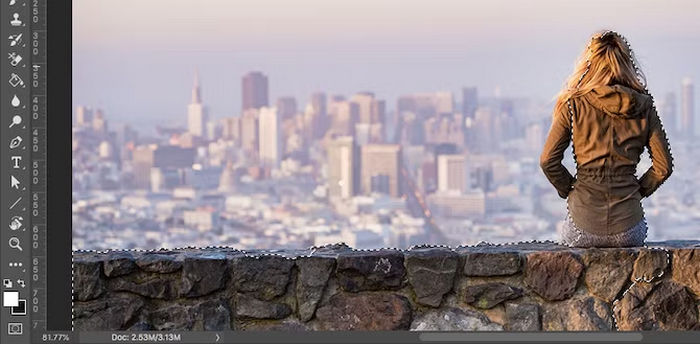
Step 2. fter that, fine-tune your selection. To do that, zoom in on your image and make your brush smaller by pressing the left square bracket. After that, just continue clicking and dragging to add the parts of the foreground object to your selection.
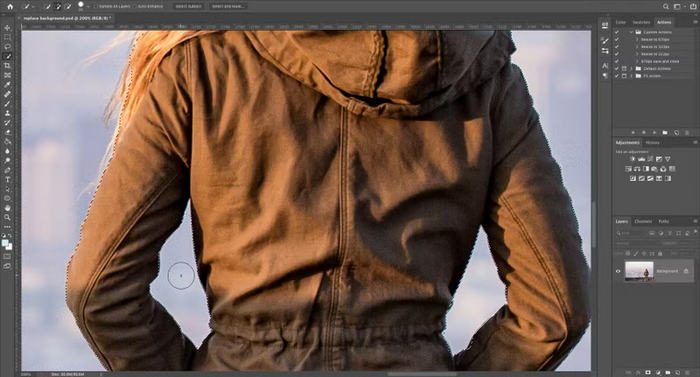
Step 3. Now, click Select and Mask in the options bar at the top of the screen to open a workspace where you can refine your selection and convert it into a mask.
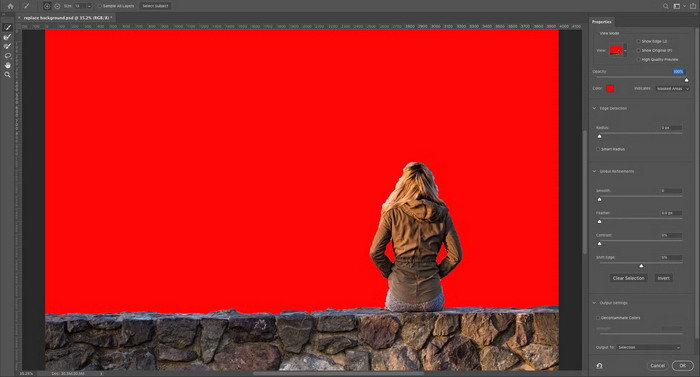
Step 4. Next, remove the color fringing. To do this, go to the Output Settings in the right-hand panel. After that, tick Decontaminate Colors.
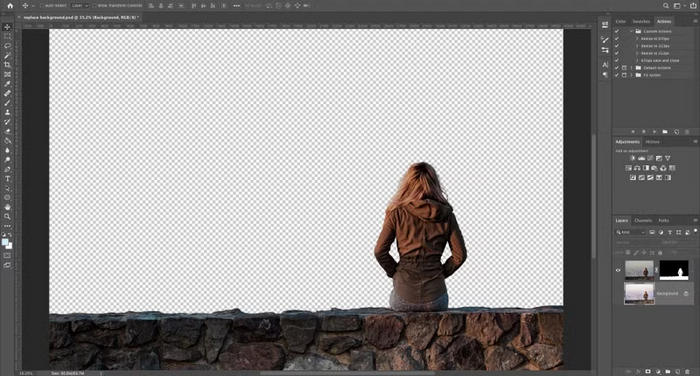
Step 5. Now, paste in the image containing your new background. To do this, place the image on a layer just below the layer containing your foreground.
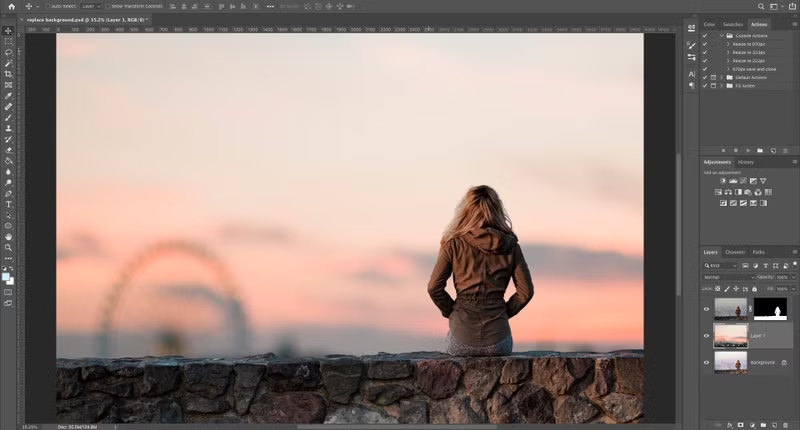
Step 6. Use the Hand tool to move the layer to your desired position, and if needed, resize it using the Free Transform tool by pressing Ctrl+T for Windows or Cmd+T for macOS. To adjust the size, drag the corner or side handles inward. Hold the Shift key while doing this to maintain the image’s proportions.
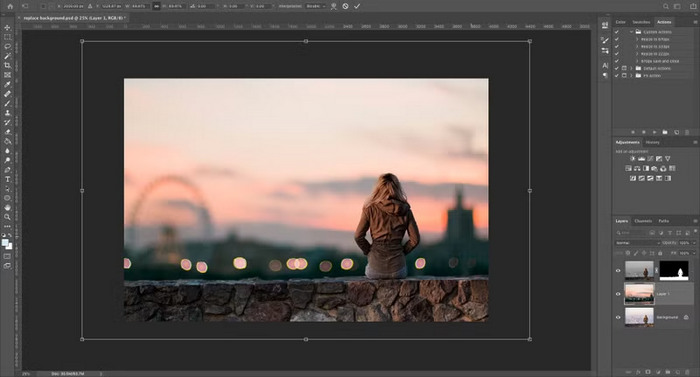
Step 7. Lastly, once done, click OK and save your file in PSD format to preserve all the layer information. Meanwhile, if you want to export it, go to Files, select Save As, and choose JPEG as your format.
When changing the background, always choose a new background that matches the lighting, perspective, and depth of field of your original photo. This helps blend the subject more naturally into the new scene, avoiding a cut-and-paste look.
Part 2. How to Change Background Color Using Photoshop
Changing a background color using Photoshop is not really a tedious task, especially when you’re already familiar with the tool’s interface and features. If you want to change the background color of your photo, follow these steps.
Step 1. Start by choosing the Quick Selection Tool. This assumes that you have already opened the image in Photoshop.

Step 2. Next, click the Select Object at the top of the screen.

Note: Photoshop uses its AI technology, powered by Adobe Sensei, to automatically detect and select the main subject in your image.
Step 3. If AI didn’t select some parts, zoom in on the image and use the Quick Selection tool.
Step 4. Alternatively, to check and adjust areas that the selection tool may have missed, press Q on your keyboard to enter Mask Mode, where a red overlay indicates the masked region. Then, switch to the Brush tool and use white to add to the mask and black to subtract.
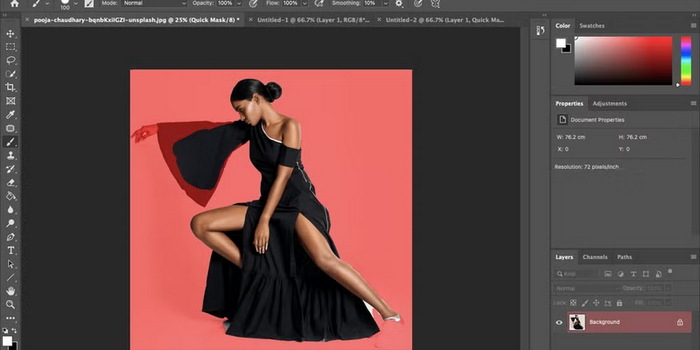
Note: Don’t worry about getting it perfect right away, as you can always fine-tune the mask after applying the new background color.
Step 5. Once the mask is done, go to the Adjustment Layer button at the bottom of the Layers panel and select Solid Color.
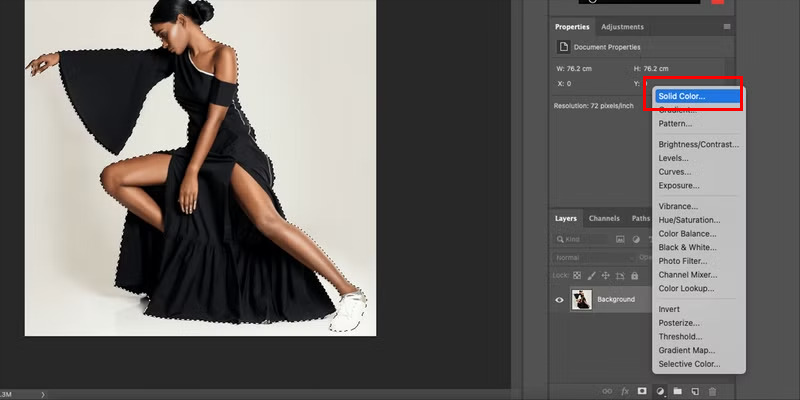
Step 6. Now, you’ll notice that your object is filled with the selected color. To apply it to the background instead, click on the mask icon that was created, then choose Invert in the Properties panel.
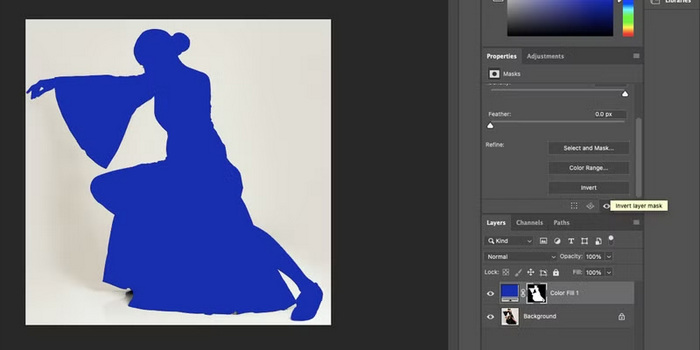
Step 7. At this stage, it’s time to refine the result. Start by going to the Blending Mode in the Layers panel and selecting Multiply. This will create a more realistic effect by enhancing shadows and other subtle details in the image. You can also adjust the Opacity to achieve a more natural look.
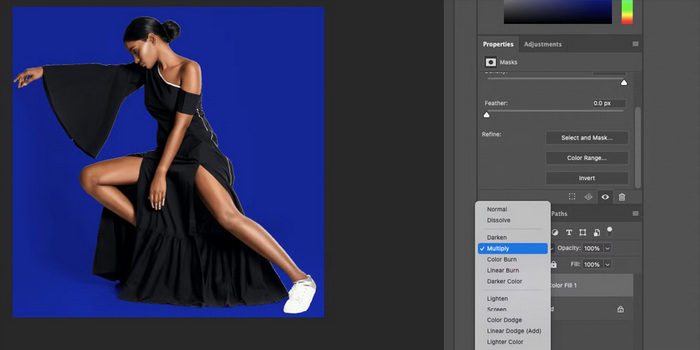
Step 8. On the new screen, choose the Refine Edge Brush. Then, go over all the edges to refine them.

Step 9. You can now pick a different background color.
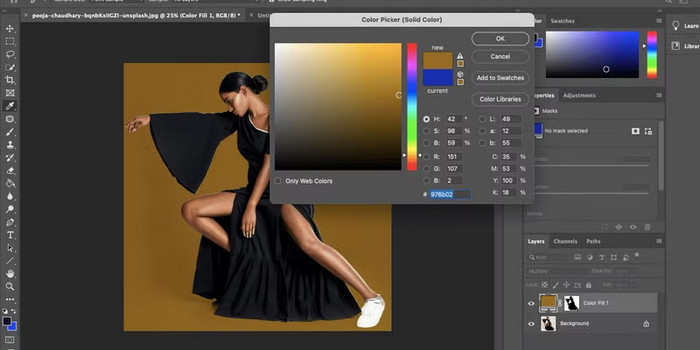
There you have it! Just ensure that when selecting a solid color background for your photo, you choose something that complements the subject. Don’t hesitate to adjust the solid color layer to match the new color of your background.
Part 3. How to Change Background Color for Free | Easier Method
In case you don’t have Photoshop and you are looking for a free alternative tool instead, don’t fret because there’s FVC Free Background Remover. This tool makes it easy for you to change the image background color without needing any editing experience. Moreover, the tool uses AI to remove the background from the photo quickly. After that, you can pick a new background color or upload your own.
Here’s how to change background color for free with FVC Free Background Remover:
Step 1. Access the FVC Free Background on their official website.
Step 2. Click the Upload Image button to import your photo.

Step 3. Now, the background photo has been automatically removed. If you want to refine the edges, go to Edge Refine and use the erase option above, then gently brush over the parts you want to remove.
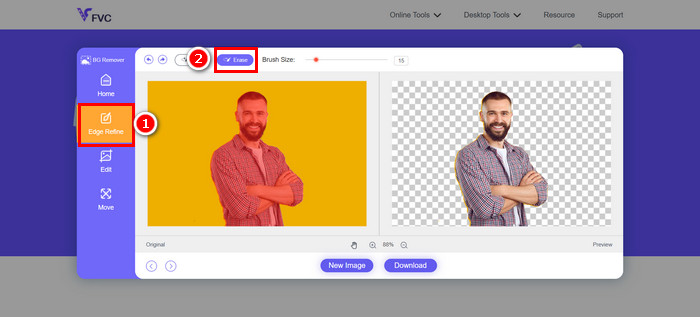
Step 4. Meanwhile, to change the background color, go to Edit and click Color to select a new background color for your photo. Once done, click the Download button.
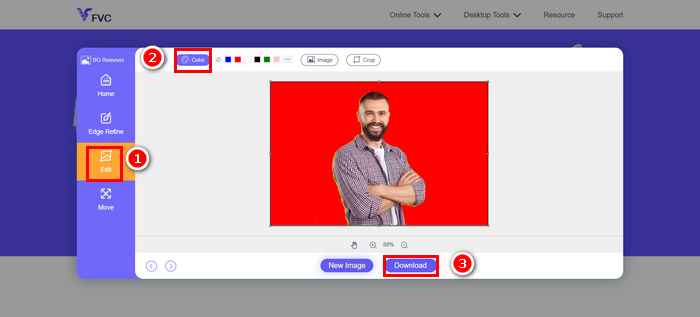
Very quick and easy, right? It is indeed that the FVC Free Background Remover is one of the best alternatives for changing background colors in Photoshop. It has a simple and very intuitive interface, is AI-powered, and highly customizable.
Click here to learn more about adding background to image if interested.
Part 4. FAQs about Changing Background in Photoshop
What’s the best way to make the new background look natural?
To make the new background blend well, choose one that matches the lighting, shadows, and perspective of your original photo. Refining the edges and using blending modes like Multiply also helps create a more realistic effect.
Can I undo or edit the background change later in Photoshop?
Yes. If you save your work in PSD format, Photoshop preserves all layers and masks, allowing you to go back and adjust or replace the background at any time.
Is there a way to smooth out rough edges around the subject?
Yes. You can use the Refine Edge Brush Tool in the Select and Mask workspace to clean up and smooth the edges of your selection, resulting in a more polished look.
Conclusion
Changing a background in Photoshop may seem complex at first, but with the right tools and methods, you can easily perfect it. Moreover, in case you don’t have Photoshop installed on your computer or it is not in your budget, you can try the FVC Free Background Remover tool to freely and easily change the background of your photos.



 Video Converter Ultimate
Video Converter Ultimate Screen Recorder
Screen Recorder


